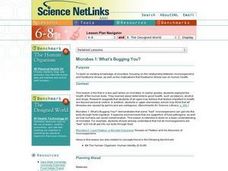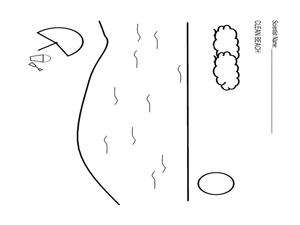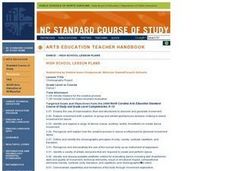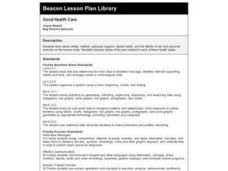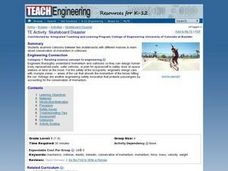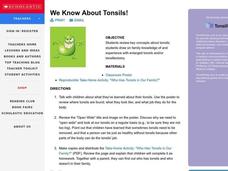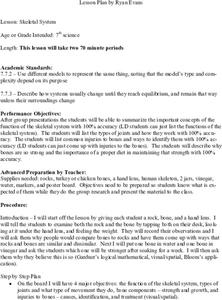Curated OER
Plants and Air Purity
Students explore how green plants help improve air quality. They read an article and discuss the importance of air quality and its effects on the human body. They investigate by connecting hose to the top of a Bell jar and to a funnel....
Curated OER
Exercise and Water
Second graders discover the needs of their body by trying different types of aerobic exercise. In this physical education lesson, 2nd graders analyze The Busy Body Book by glancing at the pictures inside and predicting what the content...
Curated OER
Pacific Salmon and Mountain Pine Beetle
Students compare fish anatomy. In this teacher demonstrated dissection lesson, students compare fish anatomy to that of humans. They explore different fish and their unique properties. There are 4 distinct activities which can be...
Curated OER
TE Lesson: What's Dominant?
Students study the number of chromosomes in the body cells, sperm cells, and egg cells of humans. They define allele, and examine the difference between dominant and recessive alleles. They complete an activity with jelly beans that...
Curated OER
Animal Skin
Young scholars investigate the skin surface to body area ratios for different animals. In this seventh/eighth grade mathematics/science lesson plan, students explore heat transfer between an animal’s body and the environment. Using...
Curated OER
MICROBES 1: WHAT'S BUGGIN YOU?
Students use existing knowledge of microbes, focusing on the relationship between microorganisms and foodborne illness, as well as the implications that foodborne illness has on human health.
Curated OER
Cells All Around
Middle schoolers measure the size of an epithelial cell and to estimate the number of epithelial cells in a given area of the body. After watching a video on cells, student groups perform an experiment using a microscope to view some of...
Curated OER
Fish Hazards
Young scholars study the Pacific salmon and see the different challenges they face. In this environment lesson plan students complete several activities that show how humans have affected the salmon environment. These activities have...
Curated OER
Choreography Project
Students produce a short choreography composition. Specific guidelines and choice of music are provided. The grade/evaluation takes place in the form of video documentation and a teacher-created rubric.
Curated OER
Good Health Care
Students work in collaborative groups researching topics such as nutrition, the benefits of exercise on the body, dental and personal hygiene. They conduct interviews, create charts and posters, and report their results with a written...
Curated OER
"ART ZOO 'Blacks in the Westward Movement', 'What Can You Do with a Portrait', and 'Of Beetles, Worms, and Leaves of Grass'"
Students study black history, examine portraits and portrait making and create their own portraits, and investigate their natural environment. This humanities lesson provides a text that can be used to teach lessons in black history,...
Curated OER
A Teeth Changing Experience
Learners research human health by reading an educational story in class. In this oral health lesson, students identify the importance of brushing their teeth and consuming calcium. Learners read the book A Teeth Changing Experience and...
Curated OER
Plants and Animals, Partners in Pollination
Students participate in multiple hands-on activities to explore reproduction and pollination. In groups, using a cotton swab and powder, students simulate being pollinators and plants. They name the parts of the flowers and the function...
Curated OER
Skateboard Disaster
Students conduct a hands-on experiment with collisions between two skateboards of different masses. They are introduced to the concept of conservation of momentum in collisions and consider how their observations might help engineers...
Curated OER
It's All About Me!
Students study the five major body system in this unit. They examine how to keep themselves healthy.
Curated OER
Ya' Gotta Have Heart
Fourth graders study the parts of the human circulatory system and how they function. They design a flow chart of the circulatory system and use data to construct charts and graphs.
Curated OER
We Know About Tonsils
Students engage in a lesson plan that is concerned with the use of tonsils in the human body. They brainstorm in small groups to review the location and purpose of having tonsils. The teacher uses a poster to help students in the class...
Curated OER
Skeletal System
Seventh graders explore the functions of the skeletal system. They collaborate in small groups to determine the function of the skeletal system, the types of joints and movement, bone strength and growth, and bone injuries including...
Curated OER
Looking at Body Language
Students examine Dorothea Lange's photograph of a migrant mother and consider how artists express emotions, ideas, and physical conditions through gesture, pose, clothing, and expression.
Curated OER
Effects of Alcohol Use
Fifth graders identify short and long term effects of alcohol use. In this effects of alcohol lesson plan, 5th graders participate in activities to understand what it feels like to have alcohol in their system. With the teacher they make...
Curated OER
HUMAN/ENVIRONMENT INTERACTIONS: CLIMATE
Students explore the various global climates and apply cultural adaptations of the peoples in various zones due to climate.
Curated OER
Circulatory System Design
Students identify the different parts of the circulatory system and their function. They work together to create their own model of the system and use it to determine the rate of blood flow. They answer questions related to their model.
Curated OER
How Much of Each Nutrient Does Your Body Need, and How Can You Find Out What Is In Each Food?
Fifth graders practice reading food labels to find nutrients in foods. In this health instructional activity, 5th graders read food labels and discuss the recommended daily allowance of each nutrient. They compare this to the food...
Curated OER
Enzymes
Tenth graders test their saliva for enzyme activity. In this enzyme lesson, 10th graders conduct an experiment to test the enzymatic activity of their saliva. They relate the lack of certain digestive enzymes with alcoholism.







